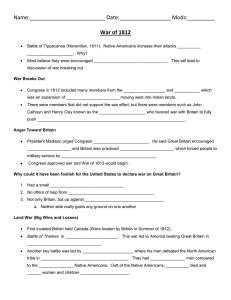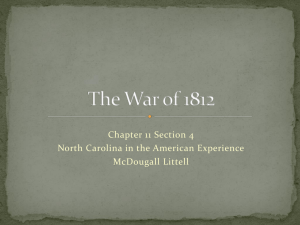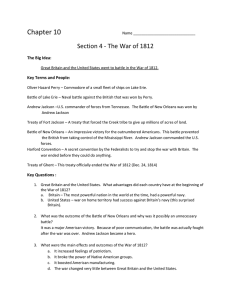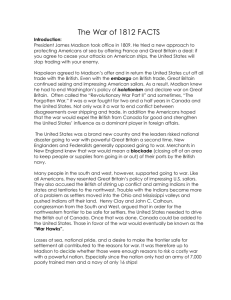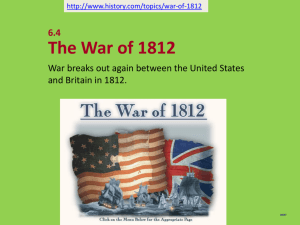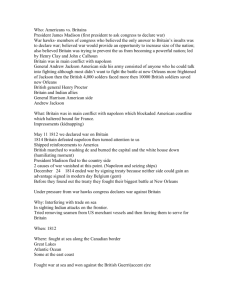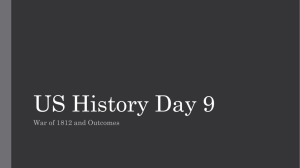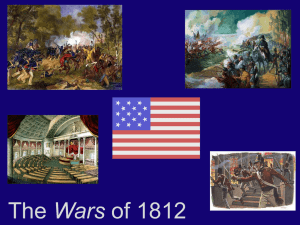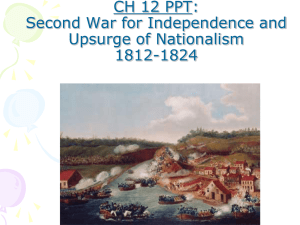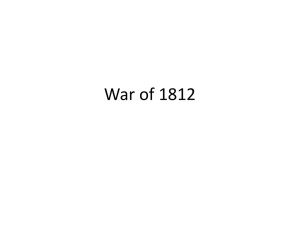The War of 1812
advertisement
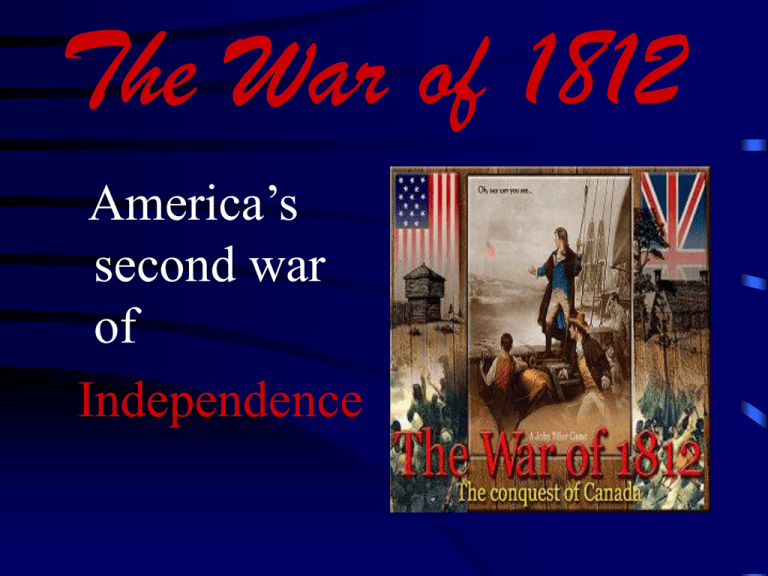
The War of 1812 America’s second war of Independence Reasons for the War Britain, France seize American ships, confiscate cargoes Impressment—seizing Americans, drafting them into British navy • Chesapeake incident further angers Americans • Jefferson convinces Congress to declare embargo, or ban on exports • Embargo, meant to hurt Europe, also hurts U.S. - Congress lifts it, except with Britain, France Trouble with Native Americans William Henry Harrison makes land deal with Native American chiefs Shawnee chief Tecumseh tries to form Native American confederacy: - tells people to return to traditional beliefs, practices Americans Learn that Native Americans are receiving weapons from the British Harrison is hero of Battle of Tippecanoe but suffers heavy losses • War hawks — want war with Britain because natives use British arms War at Sea U.S. navy only 16 ships; 3 frigates sail alone, score victories British blockade U.S. ports along east coast British Burn White House By 1814, British raid, burn towns along Atlantic coast British burn Washington D.C. in retaliation for York, Canada Francis Scott Key Key writes the “Star Spangled Banner” as he watches the shelling of Fort McHenry from a British ship. The Battle of New Orleans General Andrew Jackson fights Native Americans, gains national fame • Jackson defeats Native Americans at Battle of Horseshoe Bend - destroys military power of Native Americans in South • In 1815, defeats superior British force at Battle of New Orleans The Treaty of Ghent Treaty of Ghent, peace agreement signed Christmas 1814 • Declares armistice or end to fighting; does not resolve all issues ____ 1. The Shawnee chief Tecumseh attempted to A. negotiate a fair peace treaty with the U.S. government. B. organize a confederacy of Native American tribes. C. guide Lewis and Clark through the Louisiana Territory. D. attack British forts along the Canadian border. ____ 2. The outcome of the Whiskey Rebellion helped to establish the power of the federal government to A. impose taxes. B. enforce federal laws within states. C. control interstate and foreign trade. D. reinterpret the Bill of Rights. ____ 3. For 15 million dollars, the United States was able to purchase the Louisiana Territory from A. Spain. B. France. C. Great Britain. D. Native Americans. ____ 4. What principle was affirmed in the Supreme Court case of Marbury v. Madison? A. the right of the citizens to criticize their government B. the right of the Supreme Court to declare an act of Congress unconstitutional C. the right of Congress to declare war D. the right of states to nullify an act of Congress that they ____ 5. Why did the United States go to war against Britain in 1812? A. Britain was trying to buy the Louisiana Territory. B. Britain was interfering with U.S. foreign trade. C. Britain refused to sell tea to the U.S. D. Britain was becoming too friendly with France. ____ 6. All of the following occurred during the War of 1812 except A. British ships blockaded the eastern seacoast. B. the White House and the Capitol were burned. C. New Orleans was lost to the British. D. Andrew Jackson became a national hero.
